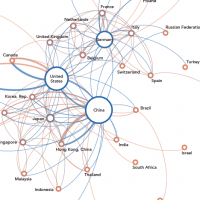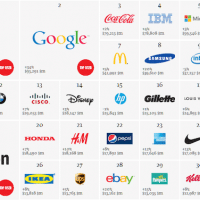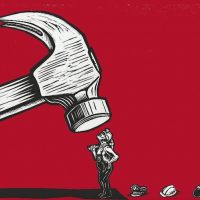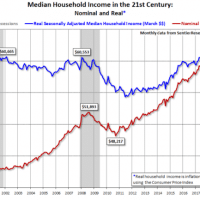-
Making excuses for unemployment: The myth of a “skills gap”
The current labor force participation rate of prime age workers, those 25-54 years, is a case in point. It remains below the previous peak rate in 2008, and even further below the peak rate at the turn of the century. We would need an additional 1.2 million employed prime age workers to match the 2008 labor force participation rate and 2.5 million more to match the turn of the century rate. Still it appears that at the present moment unemployment is no longer a major political issue.
-
They’re at it again: selling the U.S.-Mexico-Canada Agreement
The headlines once again misrepresent the aims and consequences of a U.S. free trade agreement, in this case repeating the International Trade Commission’s claim that President Trump’s U.S.-Mexico-Canada agreement (USMCA) will boost U.S. growth and employment.
-
The uneasy U.S.-China relationship: what lies ahead?
The U.S. and China are the two dominant poles in the global economy, as illustrated in the figure below which traces the global trade in parts and components.
-
Lots of noise from Trump but nothing changed for U.S. multinational corporations
Bank of France: “Six small jurisdictions (Bermuda, Ireland, Luxembourg, the Netherlands, Singapore and Switzerland), which count for less than 1 percent of the world’s population, hold 63 percent of the overall profits earned abroad by U.S. multinationals.”
-
China has an unemployment problem
Strikingly few discussions of China’s declining growth trajectory include mention of the country’s unemployment rate. Unfortunately, this official rate is worthless as an indicator of the China’s labor market conditions. In reality, China likely has a serious and growing unemployment problem.
-
Capitalist globalization is not unwinding: TNCs continue to increase their power and profits
The Great Recession of 2008 marked the end of a lengthy period of international economic growth and rapidly increasing international trade. Now, some ten years later, economic activity, including trade and foreign direct investment, remains far below pre-crisis levels with little sign of revival.
-
The Trump tax plan proves a bonanza for business
In sum, thanks to the Trump tax plan, trillions of dollars that could have been used to transform our transportation and energy infrastructure, industrial structure, and system of social services are instead being transferred to big businesses, who use them for speculative activities and to further enrich their already wealthy managers and stock holders.
-
Foxconn: playing fast and loose in Wisconsin
When state and local governments bid for corporate investment, working people lose. It is as simple as that. And Foxconn’s on-again, off-again, and on-again shrinking investment in Wisconsin is a case in point.
-
Despite offering significant benefits, Union membership continues to decline
The Bureau of Labor Statistics just published its latest news release on union membership. Unfortunately, the downward trend continues.
-
Millennials: hit hard and fighting back
A lot has been written and said critical of millennials. The business press has been tough on their spending habits.
-
Politics in America
U.S. elected leaders, and those that work for them, think their constituents are far more conservative than they are. The good news is that this means there is far more support for a progressive political agenda than one might think.
-
The U.S. economy: monopolized product markets and precarious work
Most economists and politicians sing the praises of competition. It is supposed to keep firms on their toes for the benefit of consumers and workers. Well, competition is certainly alive and well in the U.S., but the results are far from positive for working people.
-
We need to strengthen the public in the U.S. public sector
Many people have given up on the idea of government as an instrument of progressive social change, especially the federal government.
-
The law versus worker rights
Organizing a union is no easy task in the United States. Although organizing a union is supposed to be a protected right, businesses regularly fire union supporters knowing that they face minimal punishment even if found guilty for their actions. In fact, the rights of all workers, regardless of their interest in unionization, are being whittled down. Simply put, U.S. law doesn’t work for workers.
-
Corporate concentration, intellectual property rights, and U.S. public policy
Dominant corporations have dramatically increased their market power in the U.S. over the last decades, allowing them to boost their profits and, by extension, political power. And, although rarely acknowledged by the media, this trend owes much to the way public policy has promoted corporate intellectual property rights at the public expense.
-
The U.S. medical system: healthy profits at people’s expense
The health-care industry overtook the retail sector as the nation’s largest employer in December, giving local economies and their workers a stake in the industry’s growth. Health jobs surpassed manufacturing jobs in 2008.
-
A critical look at China’s One Belt, One Road initiative
China’s growth rate remains impressive, even if on the decline. The country’s continuing economic gains owe much to the Chinese state’s (1) still considerable ability to direct the activity of critical economic enterprises and sectors such as finance, (2) commitment to policies of economic expansion, and (3) flexibility in economic strategy.
-
U.S. public school teachers: declining pay, growing militancy
Strikes continue to be an effective way for teachers to improve their living and working (and by extension student learning) conditions. And, polls show that a strong majority of parents continue to support them. Popular support for teacher strikes remains strong The education pollster PDK recently asked adults what they thought about teacher salaries and […]
-
Forgotten workers and the U.S. expansion
There is a lot of celebrating going on in mainstream policy circles. The economy is said to be running at full steam with the unemployment rate now below 4 percent.
-
The 21st Century has been hard on U.S. households
The 21st Century has not been a good one for most working people in the United States. In fact, for most of this century, real median household income has been below its starting value in January 2000.




















